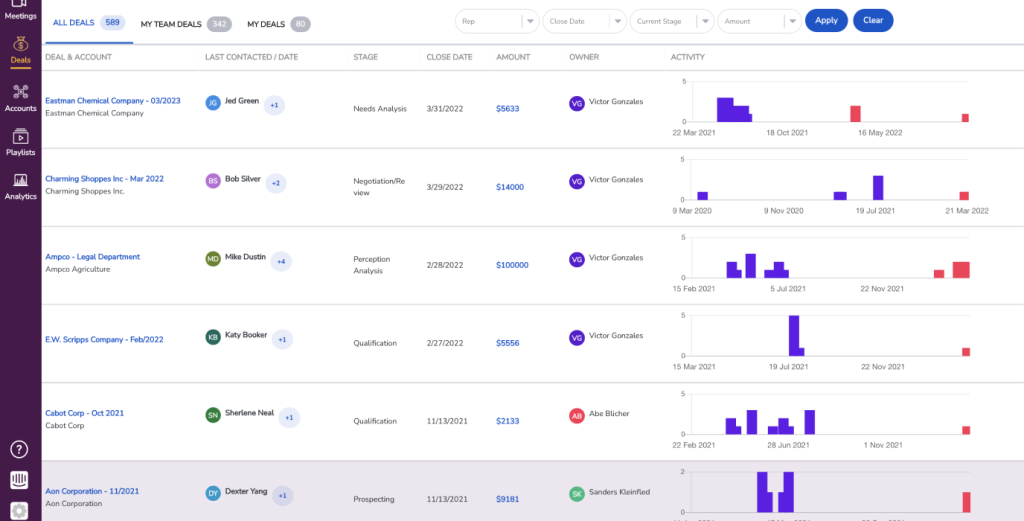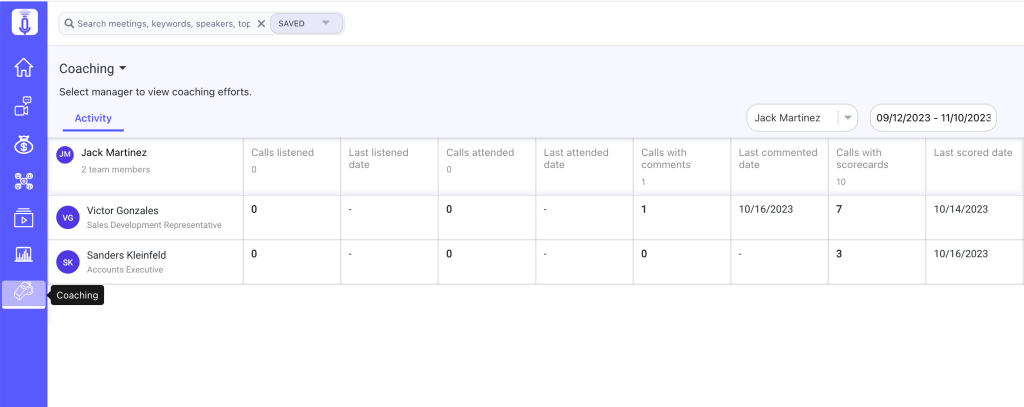Unlock 5 Powerful Analytics Strategies to Boost Sales
In today’s competitive business landscape, analytics play a crucial role in driving growth and success. Harnessing the power of data can provide insights for strategic decision-making and enable businesses to gain a competitive edge. This blog offers actionable analytics strategies that can help boost sales performance. By leveraging Rafiki.ai, an AI-driven platform, sales teams can effectively implement these strategies and improve their overall performance.
As we explore how forward-thinking companies are leveraging the growth of data analytics and artificial intelligence to create remarkable results in lead generation, people management, cross-selling, and pricing. This article aims to demystify these strategies, providing actionable insights that can transform your sales approach from intuition-based to data-driven, aligning with the trend where the adoption of advanced analytics is beginning to differentiate the winners from the rest in various industries.
Customer Segmentation Analysis
Customer Segmentation Analytics is a powerful strategy in sales that involves dividing a customer base into distinct groups. These groups are typically based on shared characteristics such as demographics, purchase history, behavior, and preferences. By segmenting customers, businesses can tailor their marketing and sales efforts more effectively, ensuring that the right message reaches the right audience at the right time.
The benefits of Customer Segmentation Analytics are manifold:
-
Enhanced Personalization: It allows for highly personalized marketing and sales strategies. By understanding the specific needs and preferences of different segments, companies can customize their offerings and communications, leading to higher engagement and conversion rates.
-
Efficient Resource Allocation: By identifying the most profitable segments, businesses can allocate their resources more efficiently, focusing on the areas with the highest return on investment.
-
Improved Product Development: Insights from segmentation analytics can guide product development, ensuring that new products or features meet the specific needs of different customer groups.
-
Better Customer Experiences: Segmentation leads to more relevant interactions with customers, enhancing their overall experience with the brand and increasing loyalty.
Implementing Customer Segmentation Analytics requires a robust data collection and analysis system. Businesses must gather detailed customer data and use advanced analytics tools to identify meaningful patterns and segments. The success of this strategy hinges on the quality of the data and the accuracy of the analysis. Once segments are identified, companies must continually monitor and adjust their strategies to align with evolving customer preferences and market trends.
Predictive Sales Forecasting
Predictive Sales Forecasting harnesses historical data, statistical algorithms, and machine learning techniques to predict future sales outcomes. This approach goes beyond traditional forecasting methods, which often rely on simple extrapolation of past sales figures.
-
Data Utilization: It involves analyzing various data sources, including past sales, market trends, economic indicators, and customer behavior patterns.
-
Identifying Patterns: Machine learning algorithms identify hidden patterns and relationships within the data, enabling more accurate sales predictions.
-
Enhanced Decision-Making: Predictive forecasting provides sales teams with actionable insights, helping them to make informed decisions about inventory management, resource allocation, and market strategies.
-
Risk Mitigation: By anticipating market changes and customer demand, businesses can proactively adjust their strategies, mitigating risks associated with market volatility.
-
Customization and Flexibility: Predictive models can be customized to fit specific business needs and are adaptable to changing market conditions.
The effectiveness of Predictive Sales Forecasting depends on the quality of the data and the sophistication of the algorithms used. Businesses need to invest in robust data analytics infrastructure and skilled personnel to leverage the full potential of this approach.
Sales Pipeline Analysis
Sales Pipeline Analysis involves examining the sales pipeline to understand the health and progress of sales opportunities at various stages. This analysis is crucial for predicting revenue and identifying potential issues in the sales process.
-
Stages of the Sales Pipeline: Sales pipelines typically consist of stages such as lead generation, qualification, proposal, negotiation, and closing. Analyzing each stage helps in understanding where prospects drop off and why.
-
Conversion Rates and Cycle Time: It involves evaluating conversion rates at each stage and the time taken to move prospects through the pipeline. This helps in identifying bottlenecks and inefficiencies.
-
Qualitative Analysis: Beyond numbers, it also includes a qualitative review of the deals in the pipeline, assessing factors like deal quality, customer engagement, and the alignment of client needs with the product or service.
-
Forecasting and Resource Allocation: By understanding the pipeline’s health, businesses can forecast revenue more accurately and allocate resources effectively to areas needing attention.
-
Actionable Insights: Pipeline analysis provides actionable insights for sales strategy adjustments, such as redefining qualifying criteria, altering engagement tactics, or retraining sales staff.
Effective Sales Pipeline Analysis requires consistent data entry and management practices. Regular reviews and updates of the pipeline data are essential for maintaining its accuracy and relevance.
Building Strong Customer Relationships
Analytics play a pivotal role in fostering personalized customer interactions. By analyzing customer data, businesses can gain insights into individual preferences, needs, and behaviors. This understanding enables companies to tailor their approach and communication, creating a more personalized and meaningful experience for each customer.
Providing exceptional customer support is essential for building strong customer relationships. Data-driven insights can help businesses identify areas where their support services can be improved. By addressing these areas, companies can enhance the overall customer experience, leading to increased satisfaction and loyalty.
Rafiki.ai’s Smart Follow Up feature is a powerful tool for maintaining strong customer relationships. This innovative feature allows businesses to track customer interactions and follow up with personalized and relevant communication. By leveraging Rafiki.ai, businesses can ensure that they are continually nurturing their customer relationships and driving sales success.
Effective Sales Funnel Optimization
The concept of a sales funnel is essential for businesses, as it represents the customer journey from initial awareness to the final purchase. A well-optimized sales funnel ensures that potential customers smoothly progress through each stage, ultimately leading to increased sales and revenue. Analytics play a significant role in streamlining and optimizing the sales funnel, helping businesses identify bottlenecks and areas for improvement.
By leveraging analytics, businesses can gain insights into customer behaviors and preferences at each stage of the funnel. These insights can inform adjustments to marketing strategies, targeting, and messaging, ensuring that businesses effectively engage and nurture leads throughout the sales process. Analytics can also help businesses identify high-performing lead sources and sales tactics, enabling them to allocate resources more effectively and drive sales success.

Rafiki.ai’s Deal Intelligence feature is a powerful tool that can assist sales teams in making data-driven decisions throughout the sales process. This innovative feature provides insights into deal progress, highlighting potential risks and opportunities. By leveraging Rafiki.ai’s Deal Intelligence, sales teams can focus their efforts on the most promising opportunities and navigate potential challenges, ultimately optimizing their sales funnel and boosting sales performance.
Continuous Sales Team Training
In the ever-evolving business landscape, continuous training is essential for sales teams to stay ahead of the competition. By investing in ongoing learning and development, businesses can ensure their sales teams are equipped with the latest skills, knowledge, and techniques to drive sales success.
Analytics can play a pivotal role in identifying areas of improvement and facilitating targeted training. By analyzing sales data, businesses can pinpoint specific skills and topics that require additional focus or support. This targeted approach to training ensures that sales teams continually improve their performance and adapt to changing market conditions.

Rafiki.ai’s Coaching Intelligence feature offers a powerful solution for sales managers to provide effective, data-driven coaching. This innovative feature analyzes sales calls and provides actionable insights, enabling sales managers to offer personalized feedback and guidance based on each team member’s performance. By leveraging Rafiki.ai’s Coaching Intelligence, businesses can foster a culture of continuous learning and improvement, ultimately driving sales success and growth.
Unlock Your Sales Potential
Embracing analytics is essential for boosting sales and staying competitive in today’s business environment. This blog has explored powerful analytics strategies, including understanding your target audience, leveraging social media, building customer relationships, optimizing sales funnels, and fostering continuous sales team training. Rafiki.ai is an invaluable tool that can help you implement these strategies effectively and unlock your sales potential. We encourage you to explore the benefits of Rafiki.ai and consider signing up for a 14-day free trial. Don’t miss the opportunity to elevate your sales performance with the power of analytics and Rafiki.ai. Start your free trial today!